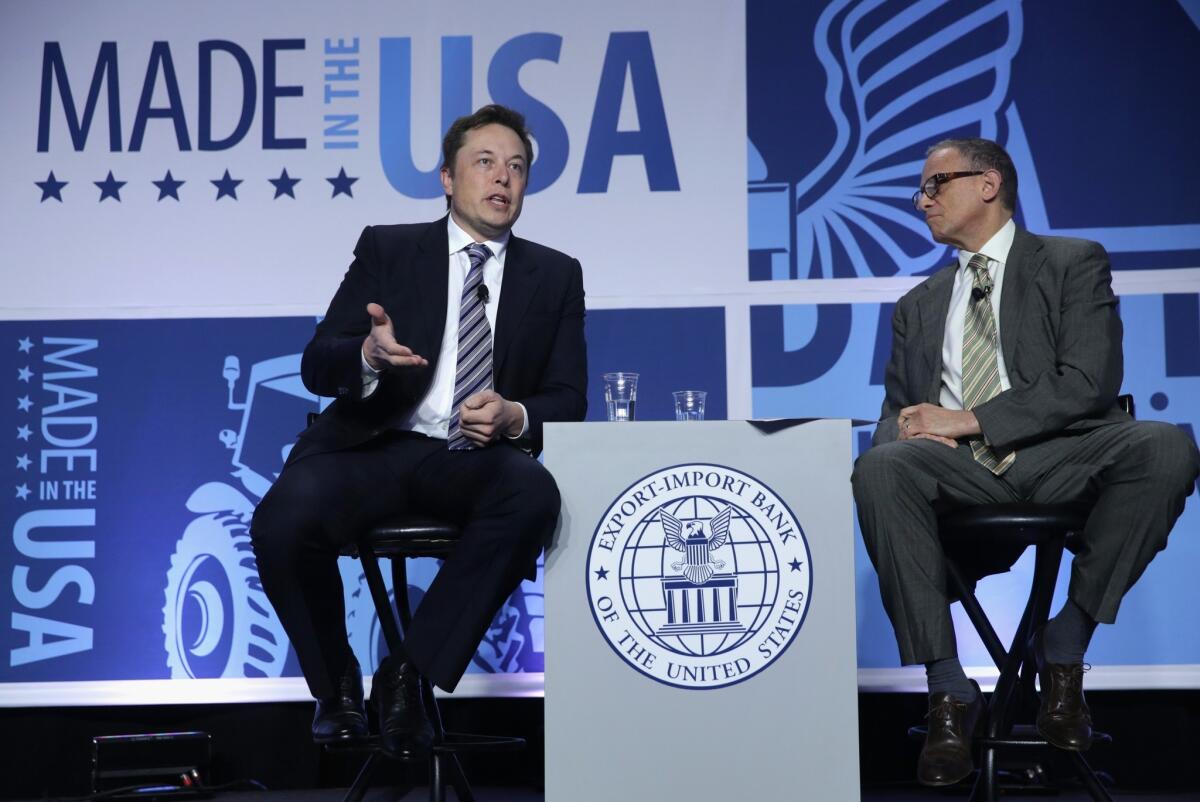Shift in GOP leadership leaves Export-Import Bank at risk of closing

For 80 years, an obscure federal agency has helped Boeing Co., General Electric Co. and thousands of other U.S. firms sell products abroad. But a sudden change in the House Republican leadership has put the Export-Import Bank at risk of going out of business.
At a hearing Wednesday, members of the House Financial Services Committee will wrangle with the bank’s president, Fred Hochberg, and his supporters as well as with opponents over whether the bank is a “corporate necessity or corporate welfare” — as a Sept. 30 deadline approaches to extend its charter.
Critics of the bank, led by top conservatives, say its $27 billion in annual loans and other export assistance for foreign buyers to purchase U.S. goods amount to “crony capitalism” that helps the nation’s wealthiest corporations while putting taxpayers on the hook for possible future losses of as much as $140 billion.
Opponents also argue that the bank is mismanaged, allegations that gained steam amid a report Tuesday that four Export-Import Bank officials have been suspended or removed as part of an investigation into kickbacks and favoritism.
“Even if the bank were working perfectly, it’s just not the proper role of the federal government to be in the financing business,” said Diane Katz, a research fellow in regulatory policy at the Heritage Foundation, a conservative think tank. “There’s absolutely no evidence that there’s any kind of failure in export financing.”
But advocates of the bank, including President Obama and major business groups, argue that it plays a crucial role in offsetting similar government export assistance from European nations and elsewhere.
Backers noted that the bank supported $37.4 billion worth of exports last year and 205,000 U.S. jobs without requiring any taxpayer funding. In recent years the bank has earned more than enough in interest and fees to cover its expenses, and last year it sent a record $1.1 billion in profits to the Treasury.
“Much of what the Ex-Im Bank is doing is supplying financing or loan guarantees that companies can’t get on their own,” said Rep. Maxine Waters (D-Los Angeles). “It doesn’t cost taxpayers anything.”
A tough fight two years ago led to the bank’s reauthorization despite strong Republican opposition. The bank had a key ally then in House Majority Leader Eric Cantor (R-Va.), who helped forge a compromise.
But incoming Majority Leader Kevin McCarthy (R-Bakersfield), who was selected after Cantor’s stunning primary loss this month to a tea party Republican, said over the weekend that he favors allowing the bank’s charter to expire.
“It’s something that the private sector can be able to do,” McCarthy told “Fox News Sunday.”
That gave momentum to a push in recent weeks led by Rep. Jeb Hensarling (R-Texas), chairman of the House Financial Services Committee, to block the bank’s reauthorization.
Questions about the bank’s future already are having an effect, as Steven Wilburn, chief executive of FirmGreen Inc. in Newport Beach, well knows.
Wilburn said he recently lost a $57-million project in the Philippines because a company there, which was going to use Export-Import Bank assistance to buy his company’s technology for extracting and cleaning biogas from landfills, opted for export financing from the South Korea government to import technology from that country instead.
FirmGreen was concerned Congress would not reauthorize the Export-Import Bank, which provides loans and other assistance to foreign entities that must be used to buy U.S. products.
The loss of the project led Wilburn to furlough three of his company’s 10 permanent employees.
“I’m not a big business. I’m not a crony capitalist,” said Wilburn, a Republican scheduled to testify at Wednesday’s hearing. “No private bank will fulfill that role for us.”
Boeing said it would be at a competitive disadvantage without the bank because its main competitor, Airbus Group in Leiden, the Netherlands, has the support of export finance agencies in France, Germany and Britain.
“The airplane market is highly competitive, and every deal is won or lost by the slightest of margins,” said Boeing spokesman John Kvasnosky. “Any uncertainty in financing availability could unnecessarily tilt the field against Boeing, putting thousands of manufacturing jobs at risk.”
Top business groups have launched a full-scale effort to save the bank.
“This is about the American economy and the fact that we are today more than ever before in a global, competitive economy,” said Thomas Donohue, president of the U.S. Chamber of Commerce. “We think the Ex-Im Bank can help us meet that challenge.”
Senate Majority Leader Harry Reid (D-Nev.) said Tuesday the bank has wide support in that chamber.
If the House takes up legislation to reauthorize the bank, it’s likely to pass because of strong Democratic backing. Two years ago, 183 Democrats joined with 147 Republicans to extend the bank’s charter for two more years and increase the limit on its overall credit exposure to $140 billion.
On Monday, 42 House Republicans wrote to McCarthy and House Speaker John A. Boehner (R-Ohio) urging them to “move forward with a multi-year reauthorization of Ex-Im that provides certainty and stability for U.S. manufacturers and exporters of all sizes.”
Boehner and McCarthy voted to reauthorize the bank two years ago. But Boehner indicated Tuesday that this time he would defer to Hensarling, whose committee has jurisdiction over the bank.
“My job is to work with our members to get to a place where the members are comfortable,” said Boehner, calling it a “thorny issue.”
“Some people believe that we shouldn’t have it at all, others believe that we should reauthorize it with significant reforms, and we’re going to work our way through this,” he said.
Chris Krueger, a senior analyst at financial services firm Guggenheim Partners in Washington, estimated there was a 40% chance the bank would not be reauthorized by the Sept. 30 deadline. After Cantor’s primary defeat, Republican lawmakers are very concerned about alienating tea party activists in their districts, Krueger said.
Separately Tuesday, a Wall Street Journal report about bank employees losing their jobs in connection with investigations of gifts and favoritism spurred more opposition from conservative activist groups.
“It’s time for Congress to shut down this corporate welfare slush fund once and for all,” said Chris Chocola, president of the fiscally conservative Club for Growth.
Export-Import Bank spokesman Matthew Bevens said the bank could not comment on personnel matters but “takes thorough and immediate action when misconduct or fraud is detected.”
More to Read
Inside the business of entertainment
The Wide Shot brings you news, analysis and insights on everything from streaming wars to production — and what it all means for the future.
You may occasionally receive promotional content from the Los Angeles Times.











